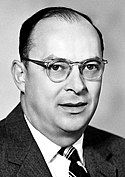John Bardeen Quote
Science is a field which grows continuously with ever expanding frontiers. Further, it is truly international in scope. Any particular advance has been preceded by the contributions of those from many lands who have set firm foundations for further developments. The Nobel awards should be regarded as giving recognition to this general scientific progress as well as to the individuals involved.Further, science is a collaborative effort. The combined results of several people working together is often much more effective than could be that of an individual scientist working alone.
John Bardeen
Science is a field which grows continuously with ever expanding frontiers. Further, it is truly international in scope. Any particular advance has been preceded by the contributions of those from many lands who have set firm foundations for further developments. The Nobel awards should be regarded as giving recognition to this general scientific progress as well as to the individuals involved.Further, science is a collaborative effort. The combined results of several people working together is often much more effective than could be that of an individual scientist working alone.
Related Quotes
She was a gypsy, as soon as you unravelled the many layers to her wild spirit she was on her next quest to discover her magic. She was relentless like that, the woman didn't need no body but an open r...
Nikki Rowe
Tags:
adventure, artist, authentic, balance, brave heart, courage, empowering women, free spirit, freedom, growth
About John Bardeen
John Bardeen (; May 23, 1908 – January 30, 1991) was an American physicist and electrical engineer. He is the only person to be awarded the Nobel Prize in Physics twice: first in 1956 with William Shockley and Walter Brattain for the invention of the transistor; and again in 1972 with Leon N. Cooper and John Robert Schrieffer for a fundamental theory of conventional superconductivity known as the BCS theory.The transistor revolutionized the electronics industry, making possible the development of almost every modern electronic device, from telephones to computers, and ushering in the Information Age. Bardeen's developments in superconductivity—for which he was awarded his second Nobel Prize—are used in nuclear magnetic resonance spectroscopy (NMR), medical magnetic resonance imaging (MRI), and superconducting quantum circuits.
Born and raised in Wisconsin, Bardeen received a Ph.D. in physics from Princeton University. After serving in World War II, he was a researcher at Bell Labs and a professor at the University of Illinois. In 1990, Bardeen appeared on Life magazine's list of "100 Most Influential Americans of the Century."Bardeen is the first of only three people to have won multiple Nobel Prizes in the same category (the others being Frederick Sanger and Karl Barry Sharpless in chemistry), and one of five persons with two Nobel Prizes.
Born and raised in Wisconsin, Bardeen received a Ph.D. in physics from Princeton University. After serving in World War II, he was a researcher at Bell Labs and a professor at the University of Illinois. In 1990, Bardeen appeared on Life magazine's list of "100 Most Influential Americans of the Century."Bardeen is the first of only three people to have won multiple Nobel Prizes in the same category (the others being Frederick Sanger and Karl Barry Sharpless in chemistry), and one of five persons with two Nobel Prizes.
